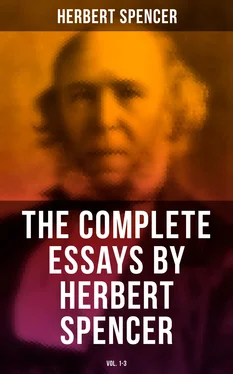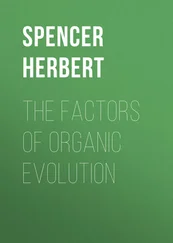Even leaving out of view the absence of those methods and criteria on which we have been insisting, it appears to us that meritorious as is Mr. Bain's book in its details, it is defective in some of its leading ideas. The first paragraphs of his first chapter, quite startled us by the strangeness of their definitions—a strangeness which can scarcely be ascribed to laxity of expression. The paragraphs run thus:—
"Mind is comprised under three heads—Emotion, Volition, and Intellect.
"Emotion is the name here used to comprehend all that is understood by feelings, states of feeling, pleasures, pains, passions, sentiments, affections. Consciousness, and conscious states also for the most part denote modes of emotion, although there is such a thing as the Intellectual consciousness.
"Volition, on the other hand, indicates the great fact that our Pleasures and Pains, which are not the whole of our emotions, prompt to action, or stimulate the active machinery of the living framework to perform such operations as procure the first and abate the last. To withdraw from a scalding heat, and cling to a gentle warmth, are exercises of volition."
The last of these definitions, which we may most conveniently take first, seems to us very faulty. We cannot but feel astonished that Mr. Bain, familiar as he is with the phenomena of reflex action, should have so expressed himself as to include a great part of them along with the phenomena of volition. He seems to be ignoring the discriminations of modern science, and returning to the vague conceptions of the past—nay more, he is comprehending under volition what even the popular speech would hardly bring under it. If you were to blame any one for snatching his foot from the scalding water into which he had inadvertently put it, he would tell you that he could not help it; and his reply would be indorsed by the general experience, that the withdrawal of a limb from contact with something extremely hot, is quite involuntary—that it takes place not only without volition, but in defiance of an effort of will to maintain the contact. How, then, can that be instanced as an example of volition, which occurs even when volition is antagonistic? We are quite aware that it is impossible to draw any absolute line of demarcation between automatic actions and actions which are not automatic. Doubtless we may pass gradually from the purely reflex, through the consensual, to the voluntary. Taking the case Mr. Bain cites, it is manifest that from a heat of such moderate degree that the withdrawal from it is wholly voluntary, we may advance by infinitesimal steps to a heat which compels involuntary withdrawal; and that there is a stage at which the voluntary and involuntary actions are mixed. But the difficulty of absolute discrimination is no reason for neglecting the broad general contrast; any more than it is for confounding light with darkness. If we are to include as examples of volition, all cases in which pleasures and pains "stimulate the active machinery of the living framework to perform such operations as procure the first and abate the last," then we must consider sneezing and coughing as examples of volition; and Mr. Bain surely cannot mean this. Indeed, we must confess ourselves at a loss. On the one hand if he does not mean it, his expression is lax to a degree that surprises us in so careful a writer. On the other hand, if he does mean it, we cannot understand his point of view.
A parallel criticism applies to his definition of Emotion. Here, too, he has departed from the ordinary acceptation of the word; and, as we think, in the wrong direction. Whatever may be the interpretation that is justified by its derivation, the word emotion has come generally to mean that kind of feeling which is not a direct result of any action on the organism; but is either an indirect result of such action, or arises quite apart from such action. It is used to indicate those sentient states which are independently generated in consciousness; as distinguished from those generated in our corporeal framework, and known as sensations. Now this distinction, tacitly made in common speech, is one which Psychology cannot well reject; but one which it must adopt, and to which it must give scientific precision. Mr. Bain, however, appears to ignore any such distinction. Under the term emotion, he includes not only passions, sentiments, affections, but all "feelings, states of feeling, pleasures, pains,"—that is, all sensations. This does not appear to be a mere lapse of expression; for when, in the opening sentence, he asserts that "mind is comprised under the three heads—Emotion, Volition, and Intellect," he of necessity implies that sensation is included under one of these heads; and as it cannot be included under volition or intellect, it must be classed with emotion; as it clearly is in the next sentence.
We cannot but think this a retrograde step. Though distinctions which have been established in popular thought and language, are not unfrequently merged in the higher generalizations of science (as, for instance, when crabs and worms are grouped together in the sub-kingdom Annulosa ); yet science very generally recognizes the validity of these distinctions, as real though not fundamental. And so in the present case. Such community as analysis discloses between sensation and emotion, must not shut out the broad contrast that exists between them. If there needs a wider word, as there does, to signify any sentient state whatever; then we may fitly adopt for this purpose the word currently so used, namely, "Feeling." And considering as Feelings all that great division of mental states which we do not class as Cognitions, we may then separate this great division into the two orders, Sensations and Emotions.
And here we may, before concluding, briefly indicate the leading outlines of a classification which reduces this distinction to a scientific form, and develops it somewhat further—a classification which, while suggested by certain fundamental traits reached without a very lengthened inquiry, is yet, we believe, in harmony with that disclosed by detailed analysis.
Leaving out of view the Will, which is a simple homogeneous mental state, forming the link between feeling and action, and not admitting of subdivisions; our states of consciousness fall into two great classes—Cognitions and Feelings.
Cognitions, or those modes of mind in which we are occupied with the relations that subsist among our feelings, are divisible into four great sub-classes.
Presentative cognitions ; or those in which consciousness is occupied in localizing a sensation impressed on the organism—occupied, that is, with the relation between this presented mental state and those other presented mental states which make up our consciousness of the part affected: as when we cut ourselves.
Presentative-representative cognitions ; or those in which consciousness is occupied with the relation between a sensation or group of sensations and the representations of those various other sensations that accompany it in experience. This is what we commonly call perception—an act in which, along with certain impressions presented to consciousness, there arise in consciousness the ideas of certain other impressions ordinarily connected with the presented ones: as when its visible form and colour, lead us to mentally endow an orange with all its other attributes.
Representative cognitions ; or those in which consciousness is occupied with the relations among ideas or represented sensations; as in all acts of recollection.
Re-representative cognitions ; or those in which the occupation of consciousness is not by representation of special relations that have before been presented to consciousness; but those in which such represented special relations are thought of merely as comprehended in a general relation—those in which the concrete relations once experienced, in so far as they become objects of consciousness at all, are incidentally represented, along with the abstract relation which formulates them. The ideas resulting from this abstraction, do not themselves represent actual experiences; but are symbols which stand for groups of such actual experiences—represent aggregates of representations. And thus they may be called re-representative cognitions. It is clear that the process of re-representation is carried to higher stages, as the thought becomes more abstract.
Читать дальше












